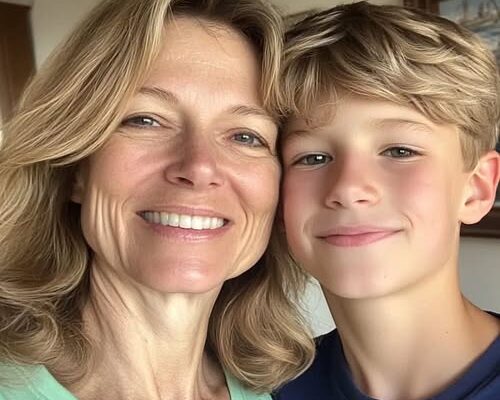When Kayla walked away from her newborn, I dropped everything to raise him like he was mine. Fifteen years of scraped knees, bedtime stories, and birthday candles later, she swept back into his life in a shiny car—and just like that, she stole him away.
Five years passed. Then came a knock that upended my world.
Kayla—my sister, my chaos—stood on my doorstep, clutching a baby boy, maybe six months old, blinking through sleep.
“Please, Mae. Just a couple of weeks while I sort things out,” she pleaded.
“What happened? Kayla, whose baby is this—when—?”
“It’s complicated,” she said quickly, shifting the baby in her arms like he might shatter. “But I’ve got a real shot this time. Some great opportunities lined up. I just need space. Breathing room. Two weeks, tops.”
“Two weeks,” I echoed.
“You’re a lifesaver, sis. I’ll call tomorrow.”
She didn’t.
Weeks turned into months. Then one day, three months later, an envelope arrived. Inside was the baby’s birth certificate—and a brutal truth I hadn’t expected.
I named him Liam, after our grandfather—the one gentle, steady figure from our childhood.
That night became the first of many milestones: his first steps across my living room, his first words, his first day of kindergarten.
He became my everything.
The price was steep. I worked double shifts—days at the warehouse, nights cleaning offices, my hands raw and blistered. When Liam turned ten and the school required laptops, I sold my guitar—the last piece of my old life.
“Where’s your guitar?” he asked, noticing the empty corner.
“It’s gone, baby. You needed something more important.”
As the years passed, Kayla remained a ghost. A brittle birthday text now and then—“Tell him happy birthday from Mom”—as if the title belonged to her by default, not by effort.
Then, on Liam’s sixteenth birthday, everything changed.
I was prepping for his party—just a few friends, pizza, homemade cake—when a sleek SUV pulled up outside. The kind of car that costs more than a year of my wages.
Kayla stepped out, unrecognizable. Designer clothes, flawless makeup, salon-perfect hair. Liam froze at the top of the stairs.
“Hey, baby,” she said softly. “Sweet 16, huh? I brought presents.”
He looked at me—confused, torn.
I’d told him the truth in pieces over the years: she struggled. Maybe one day she’d be ready. And now here she was, arriving in a luxury car like the past had never happened.
She visited every day that week, dropping off flashy clothes, telling stories soaked in nostalgia and promises. Then, she brought the grand finale.
One scorching July afternoon, a silver convertible pulled up, topped with a red bow.
I came onto the porch as Kayla got out. Liam hovered behind me, wide-eyed.
“What do you think?” she called. “It’s yours, baby.”
He screamed with joy, tore down the steps, and threw his arms around her.
“You don’t have to stay here anymore,” she said. “Come live with me. It’s time we were a family again.”
And just like that—he was gone.
No hug. No goodbye. Just excitement, gleaming paint, and the sound of the engine fading into distance.
Two days later, I got a text: Thanks. I’ll give her a chance.
Left alone in our quiet house, I gathered his old drawings—labeled “Auntie/Mom”—and his crayon Mother’s Day cards, tucking them into boxes like they were relics.
No one brought casseroles. No one sent sympathy cards. There was no ceremony to mourn a child you lose to someone still living.
I rehearsed my script: “He’s with his mom now. Yes, his real mom. It’s great. Really great for him.”
Eventually, people stopped asking.
Then—another knock.
I opened the door and barely recognized him.
“Liam,” I breathed.
He stood there awkwardly, hands shoved deep in his pockets, a duffel bag at his feet.
“Hey, Aunt Mae,” he said, voice hoarse. “She… she’s kicking me out. Says it’s time I figure out my own life.”
I didn’t speak. Just looked at this boy wearing the grown-up face of someone who’d broken my heart.
“College didn’t work out,” he said. “I wasn’t focused enough, she said. Wasting her money. Then her new boyfriend moved in and things got worse, and—”
He stopped.
“I didn’t know where else to go.”
He wasn’t here to apologize. He was here because he had nowhere else.
But he was still my boy.
“You can take the couch,” I said quietly. “I don’t have a spare room anymore.”
“And I have rules. This isn’t like before.”
He nodded. “Of course. Whatever you say.”
He got a part-time job at a garage, did his own laundry, helped with rent. Slowly, we built something again, something tentative but real.
One night over takeout, he told me everything—how the car had been leased, not bought, how it was all for show.
“It got repossessed the next year,” he said. “She used it to lure me back.”
I nodded. Not surprised.
“I should’ve called,” he added. “But at first, it felt perfect. I was finally with my mom. Then… it all fell apart, and it felt too late. Like I’d burned the bridge.”
“It hurt,” I admitted. “You were just a kid, caught in the shimmer of her charm. I get it. But you still should’ve called.”
He gave me a crooked, weary smile. “Thanks for taking me back. I don’t deserve it.”
I looked at this boy—this man—who had once called me Auntie, then Mom, then nothing.
“That’s what family does,” I said.



